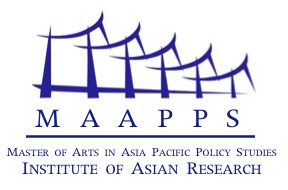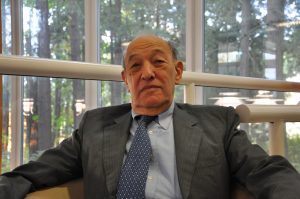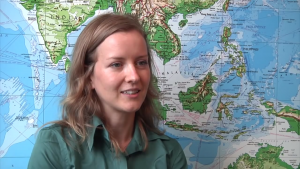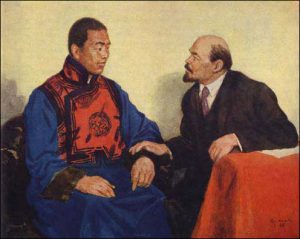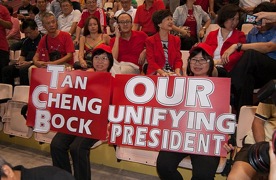Asia Pacific Policy Studies (Special Edition)
Memo #124 – Our Master of Arts Asia Pacific Policy Studies (MAAPPS) is a boutique program offering training focused on the Asia Pacific to prepare graduates for professional careers in policy-analysis and policy-making. MAAPPS gives you the opportunity to focus on topics ranging from international relations and Asia’s place in the world, to human security and human rights, governance, international development and more. MAAPPS is an innovative and flexible program that can be tailored to suit you and your goals.
Interview with Ezra Vogel on Deng Xiaoping’s Role in International Relations (Part 3/3)
Memo #123 – In this final instalment of our interview with Ezra Vogel, he turns first to the legacy of Deng Xiaoping. While Deng’s role in the suppression of popular protest at Tiananmen Square in 1989 will never be forgotten, the longer view will dwell on Deng as the man who changed China and steered the transformation that formed the China we see today. Professor Vogel then turns to Deng’s role in international relations, beginning with the predominant relationship with the US but also noting Canada’s special role in the 1970s and enduring relationship. Finally, Professor Vogel reflects on how he came to write this biography, and much of his public work, in a style that combines scholarship and accessibility.
Interview with Ezra Vogel on Deng Xiaoping and Chinese Politics (Part 2/3)
Memo #121 – In part two of our interview with Ezra Vogel, he discusses the domestic politics of Deng’s career. Professor Vogel outlines the forces that shaped Deng as a leader, from his experiences with senior Chinese communists in Europe in the 1920s to Deng’s own “years in the wilderness” in the Cultural Revolution. Loyalty for Deng Xiaoping was based on comradeship over personal friendship – his primary loyalty was to the movement and to its supreme leader, Mao Zedong.
Interview with Ezra Vogel on Writing Deng Xiaoping’s Biography (Part 1/3)
Memo #119 – Ezra Vogel is a commanding figure in scholarship on East Asia and American-East Asian relations. His major books include Canton Under Communism, Japan as Number One, and Living with China. Henry Ford II Research Professor of the Social Sciences, Emeritus at Harvard University, he has published a monumental biography, Deng Xiaoping and the Transformation of China.
Indonesian Street Vendors Imagine Democracy (Video Interview with Dr. Sheri L. Gibbings)
Memo #109 – Today, talk of democracy and what constitutes a public good is common in Indonesia among people from all walks of life. In her brief interview, SSHRC Postdoctoral Fellow Dr. Sheri L. Gibbings discusses a group of street vendors in Yogyakarta City who have taken up the cause of democracy and transparency.
Why No Anti-Mining Party in Mongolia? Why No Pro-Mining Movement?
Memo #106 – Next week, German Chancellor Angela Merkel is scheduled to address the Mongolian parliament. Her visit will come during a tumultuous period as Mongolian politicians prepare for parliamentary elections in summer 2012. Recently, 20 MPs petitioned the government to revisit the 2009 Investment Agreement signed with Ivanhoe Mines and Rio Tinto for the giant Oyu Tolgoi (OT) gold and copper project. The petition sent shares and Mongolia’s credibility as a natural resource investment destination momentarily tumbling. No enduring anti-mining coalition is behind this petition, nor has a pro-mining, single-issue party emerged.
U.S. Arms Sales to Taiwan a Sore Point in U.S.-China Relations
Memo #105 – The Obama administration’s decision to sell arms to Taiwan clouds bilateral relations with China. The timing is not ideal. Global economic recovery is volatile and tensions are increasing in the South China Sea. Next year, there will be a leadership transition in China and the U.S. will hold its presidential election.
The Xinhai Revolution and Counter Revolution on the Frontiers of Republican China
Memo #103 – The Xinhai Revolution of 1911 and the subsequent founding of the republic sought to remould China as being composed of five nationalities: Han, Manchu, Mongol, Tibetan, and Uyghur. This vision of a multi-ethnic nation had no appeal to Tibetans and Mongols. .In divergent ways, the Xinhia revolution created an opportunity for China, Tibet and Mongolia to creat a modern nation state.
Singapore’s Divisive Seventh Presidential Election
Memo #101 – Singapore’s recent presidential election (PE) was unusual as it was a highly politicized contest for an apolitical post. Unlike the previous two uncontested PE, this PE saw four candidates vying to be the country’s largely ceremonial, highly paid head of state. While three presidential hopefuls were former People’s Action Party (PAP) members, one was an opposition candidate in the general election (GE) held four months ago. On August 27, 2011, the government favoured candidate, former Deputy Prime Minister Dr. Tony Tan was elected the seventh president by a razor thin margin.
Ending Islamic Solidarity in Post 9/11 Pakistan: New Restrictions on Migrants
Memo #100 – The rise of the “security state” is not just a Western phenomenon. Post 9/11 Pakistan has seen a proliferation of new surveillance technologies that created social divisions and marginalized long-term migrants previously welcomed in the name of Islamic solidarity.
